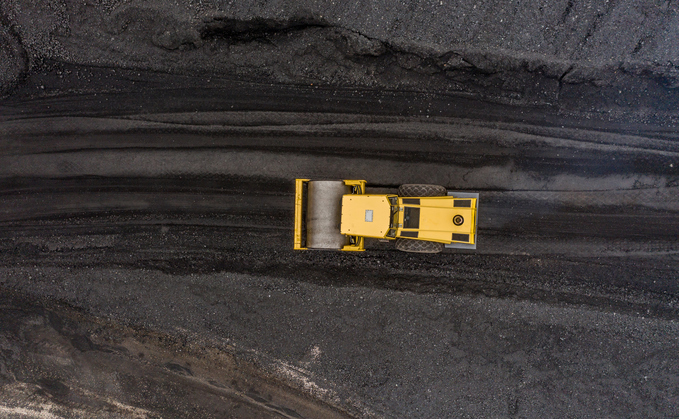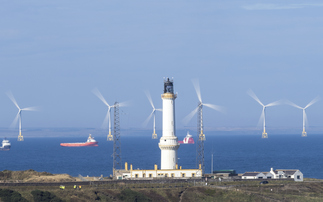
Coal is mined around the world for power and steel production | Credit: iStock
BusinessGreen sits down with CEO of the International Council of Mining and Metals to discuss the battery gold rush and the potential for a 'sustainable' mining boom in Europe
The chief of the International Council on Mining and Metals (ICMM), the joint sustainability initiative backed by the world's biggest miners, is confident Europe's drive to shore up mineral security and deliver on climate goals could result in a cleaner and greener future for the global mining industry.
"I think we are on the brink of a sustainable mining renaissance in Europe," says Ro Dhawan, arguing that projects in Europe have most of the three essential ingredients required for a successful modern-day mining project: resource availability, ESG credentials, and a favourable legislative and geopolitical environment. "Numbers two and three are really favourable in Europe," he adds. "And where there are resources, numbers two and three will help companies extract them well."
Dhawan is speaking to BusinessGreen to mark the 20th anniversary of the ICMM, which was set up by more than two dozen major miners in 2001 to help establish best environmental practices for the mining sector. He says the group's mission is more crucial now than ever before, given the extractive industries' critical role in providing the minerals and metals required for the technologies that enable a low carbon economy. "The mining industry is an enormous enabler of economic growth that is sustainable, that is environmentally positive," he contends.
It is a characterisation many campaigners would reject, given the mining sector's notoriously mixed environmental and human rights record and massive emissions footprint. A McKinsey report from 2020 calculated the sector is responsible for four to seven per cent of global greenhouse gas emissions across its operations and power use. This figure soars to roughly 28 per cent once emissions generated by the minerals it extracts - most notably, the burning of coal for power production and steelmaking - are accounted for. There will be many commentators who argue the mining sector will struggle to expand in Europe because its social license to operate is in tatters after centuries of environmental negligence and scandals, such as the 2019 dam failure in Brumandinho, Brazil, which killed 270 people.
But at the same time, Dhawan's take on the centrality of the mining sector to the net zero transition is demonstrably true. The net zero transition depends on copious amounts of graphite, lithium, cobalt, and other materials that provide the building blocks for energy efficient buildings, electricity transmission infrastructure, solar panels, electric vehicles, energy storage, wind turbines, and myriad other technologies. There is potential to create a more circular economy that ensures these crucial raw materials are re-used multiple times, but there is no credible path to net zero emissions that does not require a significant increase in demand for multiple mining commodities, even as demand for fossil fuels plummets.
The World Economic Forum estimates that production of certain minerals could increase by 500 per cent by 2050 to meet demand for clean energy technologies. Leading research and consulting firm Wood Mackenzie predicts demand for lithium could increase nine-fold between 2022 and 2050 under a decarbonisation scenario compatible with 1.5C of warming. Mining majors are set to play an outsized role in building the foundations of the clean energy economy - and are gearing up for a clean energy materials boom.
Such projections have naturally prompted concerns about an increase in unsustainable mining practices that could undermine the net zero transition and thwart progress towards a greener future. But Dhawan says the ICMM is on a mission to make the mining sector, governments and civil society understand that mining can be done sustainability.
Really high standards of environmental performance are now in place at mines around the world, he stresses. "And if one company can do it, then we can learn from that, and make that the way that everybody operates," he argues. "Our objective - and this is where I think the world's relationship with mining will change - is when the whole industry continues to perform better and better, not just one or two companies."
Dhawan details how there are already major miners operating on 100 per cent renewable power across entire continents; mining companies operating the world's largest clean energy micro-grids; mines that are able to operate with no fresh water; and mining firms that are on track to be 'nature positive' by 2030. "That's what gives me immense confidence that it is absolutely possible for the industry to meet this demand for critical minerals for the energy transition and do it in a way that minimises the harm that mining may have traditionally caused," he says.
The ICMM works to share information and guidance about sustainable practices across its 35 members and the broader industry with a view to making them the norm. It is also helping to bring nascent clean mining technologies to market - for instance electric or hydrogen trucks that can replace diesel vehicles - by connecting 'first mover' coalitions of companies that are looking to fast-track development of zero emission technologies with equipment manufacturers.
And Europe could be a place where the mining sector really proves both its sustainability credentials and its value to the net zero economy, Dhawan argues.
Once an important driver of economic growth and employer, mining exploration activity has shrunk significantly across the continent over last 50 years, with the majority of raw materials used in European products imported from countries where labour and infrastructure costs are cheaper and planning and permitting regulations less stringent. But governments across Europe are now plotting ways to open the continent up to more battery materials extraction, as they attempt to reduce their dependence on other countries for raw materials and claw back control of battery supply chains from China.
A raw materials action plan published by the European Commission in 2020 called for the "sustainable and responsible domestic sourcing and processing of raw materials in the EU", alongside a drive to ramp up materials recycling and reuse, and an effort to diversify supplies from third countries. Mining legislation is now being drafted by the Commission which officials have suggested will go further than the 2020 action plan in a bid to spur sustainable mining activity in Europe, prompting concerns from environmental campaigners.
In the UK, the government published a strategy late last month that set out its plans for bolstering the resilience of critical mineral supply chains, enhancing recycling capability across the country, while boosting jobs in minerals and manufacturing across the UK. The document sets out a vision for establishing the UK as a "centre for responsible international mining".
The various policy plans come amidst an upswing in European exploration activity, from both large miners and start-ups. For example, various small-scale lithium extraction projects are underway in Cornwall and the Scottish Highlands. In Germany, Renault, Volkswagen, Stellantis, and LG Energy Solutions have signed offtake deals for lithium scheduled to be extracted from geothermal waters under the Upper Rhine Valley in 2024. The exploration company behind the mine, Vulcan Energy Resources, has partnered with energy giant Enel to extract lithium alongside geothermal energy at a site near Rome. And in Finland, a hard rock lithium operation poised for construction has received the backing of a number of international investors, as well as company backed by the Finnish state.
But for these various mining projects to get the green light, the sector must prove the European mining industry of the future will be very different from the coal projects that have historically dominated activity on the continent, Dhawan stresses. "People in Europe will remember the mining of old days that used to take place in Europe which had significant environmental challenges associated with it," he says. "So, I can understand people's reticence with opening up Europe to more mining. But the mining that happened 30 to 40 years ago is not the same mining of today. We have much higher collective standards of performance that can ensure mining is done responsibly, [and in a way] that meets Europe's needs."
To date, the sector still faces a significant challenge winning over officials and communities fearful of the environmental damage and destruction caused by mineral extraction. A number of mining projects planned for mainland Europe have been derailed or delayed recently after facing significant public pushback.
Earlier this year, the world's largest greenfield lithium project was rejected by Serbian regulators after the Rio Tinto backed scheme faced significant opposition from locals. Meanwhile, plans for western Europe's largest lithium mine in Portugal have been subjected to a lengthy permitting processing and local resistance, with the CEO of the UK-based mining firm Savannah Resources recently stepping down after it was slapped with additional environmental licensing rounds. And in western Spain, miner Infinity Lithium has recast its plans for an open-pit hard rock mine as an underground operation which would produce less waste and leave no visible impacts on the landscape in order to try and secure support from communities and regulators.
Dhawan is under no illusions the challenges miners have in getting projects off the ground, reflecting it is not an issue particular to Europe. "[Battery materials] are seeing a massive increase in demand because of the coming energy transition, at the very same time that it is arguably the toughest time to start a new mining project," he says. The many thousands of permitting obligations new mines are subjected are "really important and critical", he acknowledges, but they must be processed more quickly if clean technologies are to be deployed at the pace and scale needed to slash emissions. "We have to find ways to allow responsible mining projects to grow and expand, to provide the metals and minerals that are needed for the transition, and to provide the stock of metals and minerals that can then be used in a circular economy," he says. "There is no circular economy if you don't have enough materials to go around."
But the mining sector clearly has a long way to go to convince investors, campaigners, and the public it can deliver on its sustainability and emissions reduction commitments. ICMM companies have collectively pledged to achieve net zero across their Scope 1 and Scope 2 greenhouse gas emissions by 2050 or sooner, but few have announced net zero targets that account for their value chain or Scope 3 emissions, despite these making up as much as 95 per cent of a company's total footprint. A 2020 report from Transition Pathway Initiative investor group noted that none of the 10 largest mining companies was aligned with a 1.5C pathway, with just two firms - Freeport and Grupo Mexico - aligned with limiting climate change to a 2C scenario.
Dhawan says the group is working with the Science-Based Targets initiative (SBTi) to create a Scope 3 emissions accounting framework for the sector, which would enable its members to meet a commitment to set a detailed, transparent Scope 3 target by 2023. But he notes ICMM will not be pushing for members to achieve any particular level of emission reduction across their Scope 3 emissions once the framework is established. "We don't see it as our role to police individual company's targets, we see it as our role to set the framework so that every company sets, robust, credible, transparent targets, and it's up to their stakeholders to then judge whether those are sufficient in line with the Paris Agreement," he says.
ICMM is also working with the investment community to create convergence around the sustainability disclosures that are requested of mining firms "What we've found is that there's been a huge increase in the number of information requests from investors for companies on decarbonisation," he says. "And that's a good thing. But at the same time, the fact that there are so many different ones creates a huge burden, and also creates confusion about how best to report the information."
And then there is the elephant in the mine. While the mining industry is investing heavily in the extracting the minerals that underpin the clean tech boom, many of the same companies are continuing to extract the world's most polluting fuel: coal. Moreover, campaigners maintain that few if any leading mining companies have a credible plan for shuttering coal mines, as they transition towards extracting clean tech minerals.
Does Dhawan see an inherent contradiction between ICMM's mission as an initiative committed to making mining sustainable and the extensive coal extraction activities of some of its members? He insists not, stressing that ICMM's focus has always been on the process of mining, not the afterlife of its products. "We do not currently have an intention to have a policy about companies not producing coal, because there are different ways in which the world can decarbonise and reduce its coal consumption, and we're not taking a position on which one is right," he argues.
Across the sector, companies are taking varied approaches to winding down their coal assets. BHP and Anglo American, for instance, have sold off their thermal coal production assets to other companies following investor pressure, whereas Glencore has argued it is more "environmentally responsible" for it to slowly wind down production of its most carbon intensive assets over time rather than sell them to a firm that operates with higher carbon emissions. Although critics will note that it is unclear how the firm's announcement in mid-July that it was expanding coal production at its Hail Creek Mine - which scientists have warned is a methane hotspot - squares with this stated objective.
Dhawan says the Ukraine crisis has highlighted the dangers of energy insecurity and argues that while miners "need to do everything they can" to reduce emissions, governments, investors, and companies must work together to find ways to shrink demand for polluting minerals in a sustained fashion. "The world is once again consuming large amounts of fossil fuels because we have no alternative at present, because we haven't sufficiently decarbonised demand," he reflects. "And in mining, it's a similar story."
The answer, as is so often the case with the net zero transition, is likely to lie with emerging technologies. "Once we have steelmaking technology that doesn't require metallurgical coal in the same quantities, or at all, then that solves the issue," Dhawan says. "That's how we've been thinking about the coal debate. But as long as coal is being produced, whether its metallurgical or thermal, then it's our top priority that that ICMM members do it as responsibly as possible."
It remains to be seen whether Dhawan's vision of a 'green' mining boom in Europe materialises. But it is clear the transition to a truly green economy depends on the mining sector engineering a net zero commodities boom, and doing it in a way that is as sustainable as possible.
This article is part of the Net Zero Commodities Hub, hosted in partnership with Wood Mackenzie.
Want to find out more about the net zero transition and how businesses are seizing the opportunities on offer? Sign up now for the Net Zero Festival, which will take place in London on September 28th and 29th.








